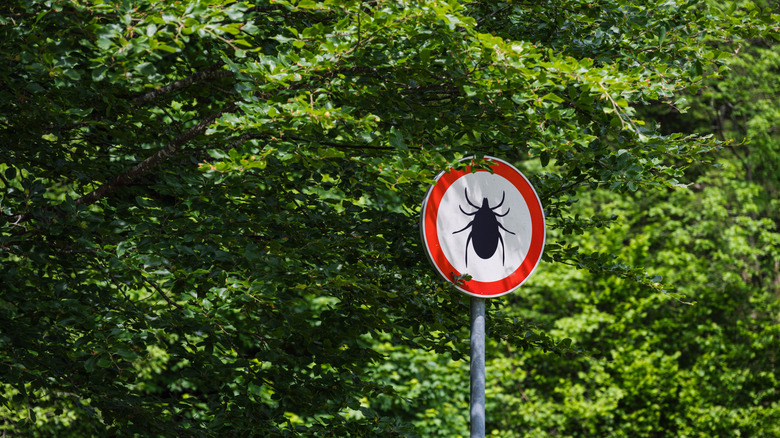Can Plants Really Keep Ticks Out Of Your Backyard? Here's What The Science Says
We may receive a commission on purchases made from links.
If you love to garden and spend time in the yard, the last thing you want is to worry about a tick bite. So, you might be wondering if there are any plants you can grow to keep ticks away. Unfortunately, there's no evidence to suggest that simply growing certain plants in a yard will serve as an effective tick deterrent.
Ticks use their scent to find hosts. They have small detectors on their legs that help them identify body heat, odors, and even carbon dioxide from afar. Various studies have sought and found ways to confuse and repel ticks using strong-flavored plants, including some crowd favorites like thyme, basil, rosemary, lavender, and citronella. However, these studies were conducted using highly concentrated extracts or essential oils from these plants. Hoping that planting any of these varieties will effectively keep ticks out of your backyard is a bit of a stretch.
Getting your tick deterrence strategy right is essential. Ticks are not only annoying, but they also put humans and pets in danger with their bites. These pests often carry bacteria that cause serious health issues like Lyme disease and also spread viruses and parasites. Whatever you do, never skip checking yourself for ticks after spending time in the yard. Ticks don't just bite and walk away; they like to attach themselves to their victims. If you find one, follow the tick removal recommendations of the U.S. Centers for Disease Control and Prevention and, if you have any rashes, consult a doctor.
The science on using plants to deter ticks
The reason plants aren't as effective as essential oils is simply because their scents are a lot less concentrated and fragrant. Essential oils are made through cold-press extraction or steam distillation, which creates a concentrated solution from a batch of the original plant. To use these scents to repel ticks, you'd have to create a spray or ointment to apply to yourself or your clothes. That way, the scent of the essential oils can overpower your own body's smell to either cover it up or dissuade ticks from coming too close. There's no viable way to deploy these oils in the entire yard.
If you'd like to use your garden to repel ticks, consider growing some of the plants mentioned above, invest in a distiller, and make your own essential oil. You can find several tools to extract the oil online, like this LETIME essential oil distiller, but beware that they're not cheap. Once made, you can mix the oils with water to create a tick spray for clothes. You can also make a lotion using some coconut oil and the essential oil to apply directly to your skin. Some essential oils can give some people allergic reactions and skin rashes, so it's best to do a small skin test before applying.
While growing plants that contain tick-repelling oils isn't guaranteed to keep the parasites out, you should avoid plants that actually attract ticks to your yard. In addition, stay on top of mowing the grass, which makes it harder for ticks to survive and thrive. Unfortunately, that's about as far as science goes on landscaping techniques and selective planting as a tick deterrent method.
Effective natural remedies against ticks
An all-natural way to reduce the tick population in your yard is to grow the kinds of plants that tick-carrying host animals don't enjoy. Deer, for example, are major carriers of ticks, so anything you can do not to draw them near your garden will have a major impact on fighting off ticks. It may sound insignificant, but it isn't: A single deer can carry up to a thousand ticks. Fewer deer means fewer ticks.
There are natural ingredients that can repel deer from your yard and garden, like garlic. However, they won't be of much use if you're growing them alongside plants deer like to eat (the animals are smart enough to go around or hop over the stinky garlic on their way to a nice meal). What's more important is to look at plants that deer do like to eat and avoid growing them in the yard. These include hostas, tulips, lilies, sunflowers, and roses; you can replace them with plants like thyme, oregano, mint, sage, daffodils, juniper, or peonies. Another surefire way to deny deer access to your property is to protect it with a physical barrier (before you get started, read our tips for building the perfect fence).
No matter what tick-repellent strategy you land on, remember to take extra steps to protect yourself from ticks. Wear long pants tucked into socks and closed shoes when gardening or doing yard work. To be extra safe, use some tick repellent that contains active ingredients recognized by the Environmental Protection Agency, like DEET.


